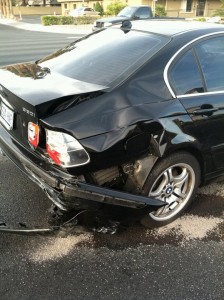 When I advise clients they need to make an uninsured or underinsured motorist claim on their own insurance, they are often hesitant to do so, fearing their insurance will either raise their rates, or cancel the policy altogether. However, Nevada has a statute exactly on point, precluding insurance insurance companies from doing either.
When I advise clients they need to make an uninsured or underinsured motorist claim on their own insurance, they are often hesitant to do so, fearing their insurance will either raise their rates, or cancel the policy altogether. However, Nevada has a statute exactly on point, precluding insurance insurance companies from doing either.
An uninsured motorist policy provides insurance coverage for the negligence of a driver that causes damages who either has no insurance, or cannot be located. In such instances, the claimant’s own insurance company provides insurance up to the policy limits for this uninsured driver.
An underinsured motorist policy provides coverage for a driver who has insufficient insurance coverage to pay for all of the damages he or she caused. In such instances, the claimant’s own insurance policy provides additional coverage over and above the negligence driver’s liability policy, up to the policy limits.
In Nevada NRS 687B.385 provides
An insurer shall not cancel, refuse to renew or increase the premium for renewal of a policy of motor vehicle insurance covering private passenger cars or commercial vehicles as a result of any claims made under the policy with respect to which the insured was not at fault.
The pertinent Nevada Administrative Code (NAC), 687b.850 provides:
1. An insurer shall not cancel, refuse to renew or increase the premium charge for the liability coverage under a policy of motor vehicle insurance upon renewal of the policy of motor vehicle insurance because of an accident that is not a chargeable accident.
2. Each insurer shall file with the Division its definition of a “chargeable accident” and shall use the filed definition. The insurer’s definition of a “chargeable accident” may include only those accidents for which the insured is 50 percent or more at fault.]
3. Each filing of a rate for a policy of motor vehicle insurance submitted to the Division must define a “chargeable accident” in terms of a monetary amount of damage.
4. An insurer may not define a claim made under the comprehensive portion of a policy of motor vehicle insurance as a chargeable accident in order to increase the premium for the policy or to cancel the policy, but the insurer may use a series of such claims to discontinue comprehensive coverage or to offer a higher deductible for comprehensive coverage upon the renewal of the policy.
The plain language of the statute and code preclude insurance companies in Nevada from raising rates for people who make a UM/UIM (no fault on the part of the insured) claim. The Nevada Supreme Court has upheld the statute despite the insurance industry’s claim that it amounted to an unconstitutional taking. See Reinkemeyer v. Safeco Ins. Co. of America, 16 P.3d 1069, 117 Nev. 4 (2001) (holding the statute that prohibits an insurer from cancelling, refusing to renew, or increasing the premium for a policy of casualty or property insurance as a result of claims with respect to which the insured was not at fault is not facially unconstitutional under the state due process and takings clauses):
NRS 687B.385 applies only to those policies where insurers attempt to cancel policies or increase premiums because an insured has submitted claims for which the insured is not at fault. While NRS 687B.385 may necessitate an insurer sustain a loss on an individual policy, unlike the statutory scheme invalidated in Guaranty, NRS 687B.385 does not deprive an insurer a fair and reasonable rate of return on homeowners protection. Therefore, NRS 687B.385 is not facially unconstitutional.
With nearly 25% of the drivers in the Nevada being uninsured, and many more not having sufficient insurance, when you are in an accident, it is imperative that speak with an attorney who has experience exploring every avenue of recovery. Yan Kenyon has that experience, and provides free initial consultations. Further, Yan Kenyon does not get paid for making your UM/UIM claim unless you do.
-Jay
Jay Kenyon is a founding partner of Yan Kenyon, and his practice consists solely of personal injury claims and litigation.
